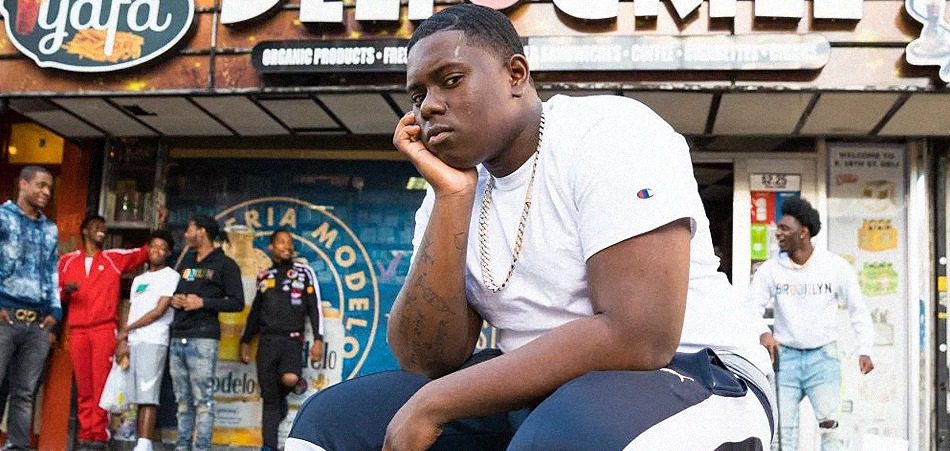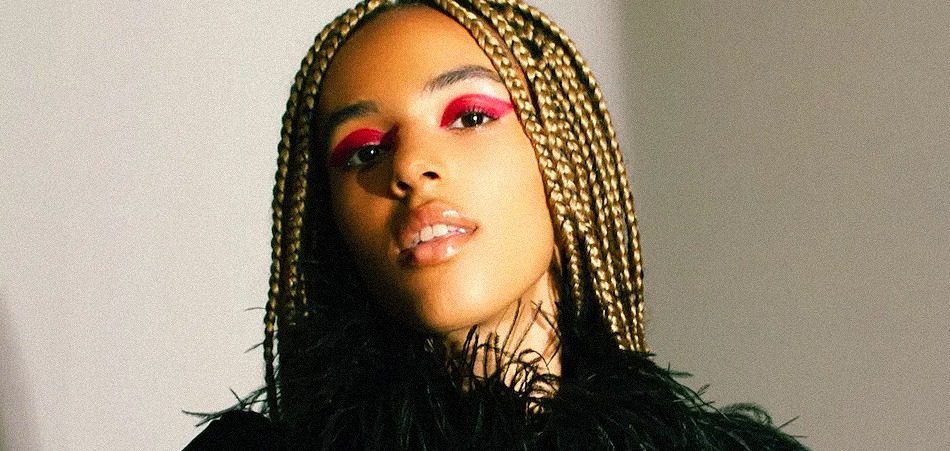In the depths of this tumultuous year, the nation’s outgoing leader responded to the pandemic with sardonic mockery while the full extents of racial injustice were rightfully brought to the mainstream media’s eye. Chicago-based Latinx trans woman Ariel Zetina reacted to such fractious ecosystems by partnering with Smartbar and Red Bull to produce Diamond Formation URL – a digital rave spotlighting U.S.-based queer artists which raised money for charities supporting the BIPOC and trans communities in Chicago. Like Zetina’s own style, which fuses together techno and house while paying homage to the Belizean genres of punta and brukdown and the queer scene worldwide, all of the DJ’s brought their own technical and ecstatic flair to the event. Shortly after Diamond Formation URL, Ariel slyly released a two-track EP Marsh—an ambient rebellion to the classic 4×4 club structure imbued with reconstructed sentiments of healing and abstracted rejuvenation.
EARMILK had the chance to speak to Zetina on the phone to delve into the intention and curation behind her latest event, her relationship with Discwoman, her work in the theatre, and the role dance music can play in fuelling social justice campaigns.
You can feel the warmth of Zetina’s character through the phone as she talks wholeheartedly about the need for community events to simultaneously exist online so that groups from around the world can feel secure and a part of something. She’s loudly spoken, a quick talker and laughs as she backtracks, realising she has gotten lost in a thought loop. You can tell that the thoughts in her mind are buzzing around at a million words per minute. She explains that when the idea of hosting an online community-focused rave developed more concretely, the next step was finding people doing similar work to join. Along with Miss Twink USA, Dutchez Gemini and Red Bull, they searched for “people in other queer scenes or who are making a bunch of music that is being accessed by a lot of queer people” while also “making sure it was a really heavy people of colour focused event, ” she shares.
Diamond Formation URL ran on Saturday August the 1st, on Smartbar’s MixCloud Pro. The dream line-up included DJ Stringray, Akua, Ariel Zetina, SWISHA, Kush Jones, Miss Twink USA and many more. The beneficiaries of the event were collectives and organizations that champion black and queer voices, at a time where it is unfortunately needed most. Such other organizations a part of the charitable music event included Brave Space Alliance, Afrorack, Molasses Chicago and Little Village Solidarity Network.
View this post on Instagram
As we raved about the success of The Diamond Formation URL and how fantastic it was to bring this tight-knit Chicago community to the internet sphere, dance music was given its respect as the great medium for much of our culture’s social change. Zetina simplified it to a two-tier process: the physical effect of dance music and the effect that comes with awareness and recognition. “You can feel the kick drum, the actual vibrations. That allows people to get into a meditative state,” she notes, though she uses the word meditative with a grain of salt, understanding that while meditative can signify a certain zen-like quality, it can also be loud, physical, and social. “There’s a sort of group meditation that can happen with dance music that can really transport and make people see things differently and think differently. It’s unifying in a lot of ways”.
The second tier, to Zetina, is the collective union formed when punters can witness like-minded DJs and artists running activism events. According to her, the biggest activist events in Chicago are run by the DJs, producers, and drag queens. “This moment has really shown that lots of people — especially in Chicago — are really connected to the origins of dance music, and the fact that a lot of the stuff that his happening right now is happening to queer black people, people of colour and black people in general shows the importance of being so connected, particularly in the queer scene, to histories of where people are in the same space together where they normally wouldn’t be, actually having these conversations”.
While there is rebellion towards commercialist structures, particularly from underground communities, she is aware of the commonalities between their purposes and petitions for a stronger union. “It’s tricky because I feel as if there’s this pro-capitalist vs anti-capitalist antithesis that happens in dance music, especially working with venues and sponsorships.” While dance music’s history is rooted in the underground, in marginalised voices protesting for change, Zetina recognises that the rise of commercialist structures has allowed such communities to have a voice in the mainstream. This leads to more funding, a greater cultural movement and a sort of legitimacy granted to dance music. Zetina is grateful for Smartbar, who she believes has made significant steps to be uplifting to underground artists. Notably, it is an individual club that has great links with the underground, meaning that a DJ or producer can go from playing a DIY rave to being booked at Smartbar right after. Such a symbiotic union between the underground and individual clubs means that the talent that deserves to be heard can get light on the world podium.
Integral to Zetina in mitigating the underground vs institution opposition is the dialogues construed between all people involved in the club scene. Zetina believes event programmers should have a clear and open dialogue with the bartenders, managers and especially with security, which she views as the most important aspect of the dance ecosystem. “The places I try to avoid are the places where there is a cop mentality with security”, such a mentality is in diametric opposition to the freedom, rebellion and community seeded in dance music as a genre and movement.
As a Latinx trans woman, one of the hardest things Zetina had to learn over the years was where to find the right support. After signing onto Discwoman – the New York-based collective and booking agency representing womxn, trans women and gender queer talent in the electronic music industry – she could finally stop stretching herself thin and focus only on the music, and let someone else promote it. “I found that a lot of the stuff that Discwoman was doing was a lot of the stuff that I was doing also. Music-wise, the sort of mixing with techno and house and club music was something that I was also very interested in”.
Zetina still stands that the “Discwoman 32 x Ariel Zetina” mix she did was filled with the most effort she’s ever put into a project, period. She did more drafts than she had done in her entire life as she describes “I really cared about it, I thought that I had to get this perfect, it has to be a journey. It has to be the exact perfect everything.”
There is a whimsical, dark and intoxicating journey in “Discwoman 32 x Ariel Zetina”. The sense of narrative and journey is a feature that ultimately continued through all of her work: both DJ mixes and production. This is likely a manifestation of her artistic upbringing in theatre, which has in many ways guided her creative approach to music. Theatre is the only discipline that Zetina has studied formally at University, and before that she was guided into exploring a lot of performance art and adaptation. Alongside deejaying and production she has always continued writing plays, though usually quietly and quite secretively. Currently she is writing some plays on a commission basis, and clearly her understanding of rising tension, climax, diffusion and movement in general within narratives still has a strong influence on her music.
She details that the way she makes mixes and albums “involves a lot of the wordplay that is in my writing.” This interplay between her creative spheres is why “I use a lot of text in my music work and why I use a lot of music in my theatre work.” Such a union is clear in her EP MUAs at the End of the World, a conceptual EP that is a sonic reinterpretation of the repetitive sounds of applying make-up.
Soon after The Diamond Formation URL, Zetina released an ambient exploration of experimental sounds in two acts titled Marsh EP. “It’s named Marsh after the landscape which I grew up in right outside of Jacksonville, Florida” she remarks, “where the marsh was my backyard. It’s literally mush and swamp and I wanted that environment in people’s heads when they listen to it”.
One particular single, “Artificial Science” completely encapsulates this environment in a farrago of atmospheric pads – some hauntingly discordant and others that blend together in effortless harmony. Minimal elements are given space to breathe and expand at their own pace in this track, a quality that traditional 4×4 club music often takes for granted. While the ambient style may seem out of comfort for her, she confides that she has always had ambient tracks in the background and adores environmental soundscapes, such as her marsh. “I’m so fascinated by film scores, which also helps me understand ambient music,” she divulges.
Tracks like “I Miss the Sea (Deconstructed)” largely follows the same genetic imprint, with raw vocal samples and spoken word from Paul Nacif reconstructed into a hypnotic miasma of digi-flutes and roaring choruses. While MUAs at the End of the World is a more conceptual EP, the Marsh EP is more a Frankenstein of several pieces Zetina had in the midst and those improvised in performances, puzzled together. Zetina wanted to strip away from the limitations of being a strictly dance music artist. Though, notably, ambient and dance music are rooted in the same thread for Zetina. “Ambient music often does a lot of the same stuff as dance music does. It’s also because of the fact that I grew up in an intense theatre world where so much movement is to beat-less ambient work. I’ve been listening to Meredith Monk and Steve Reich, sort of proto-minimal really pretentious bullshit from the ’70s and ’80s. I’ve always been interested in that sort of stuff and wanted to make something with a healing energy to it”.
Zetina often comes back to the tension between peacocking the greatest extent of her productional capabilities with the freedom to allow minimalistic aspects to speak for themselves, without pressure. She laughs that she is still learning and tackling this common tension, looking back at things that she thought was so maximalist at the time but now she views it as minimalist, and vice versa in her production. Though in Marsh EP it is clear that she has rejoiced in the latter prerogative, where she navigates this tension while also presenting us with a transcendental and meditative exploration of current times.
It’s a tension that any artist has, I’m sure at some point, unearthed for themselves in their own practice. “There’s this tweet that Umfang tweeted that said something like “delete 3 channels then export” as the editing process and I feel as though a lot of the time it is so hard to know how many ideas are enough and how many are not. Now I’ve been trying to trust in one or two elements. I’ve also realised that multiple instruments can work together to make one element”.
Nevertheless, the tension sticks with her as she begins to exert more energy into writing. “I feel as though I have always felt the need to show off my writing and say what I have to say. Something that always sticks with me is from Anne Bogart’s book Viewpoints. She says that if you really commit to doing a certain form, thematic element or style, your natural intricacies will come out. So you do not have to focus on making your voice unique, that will naturally come out.”
also the way i dj is part of a pantheon of amazing djs in chicago!!!! i love when friends come to visit and r shook at what we do on like a wednesday night
— @riel zetina (@arielzetina) October 11, 2020
Profits of up to $500 from the Marsh EP will be donated to JASMYN — an organization that creates safe spaces for LGBTQ+ people in Jacksonville, Florida —and Paquetá Sem Fome — an organization raising funds for the residents of Paquetá, a neighbourhood in Rio de Janeiro which has the second largest population of elderly people who are greatly affected by the pandemic.
To end the year, Zetina is exerting most of her energy on her commissioned plays and writing projects. Nevertheless, she is consistently blown away by the expertise and technicality of the queer music scene in Chicago, and is perpetually working on building a community for it to be recognized on a global basis, as it deserves.
Connect with Ariel Zetina:Facebook | Instagram | Twitter | Soundcloud | Spotify | Bandcamp










